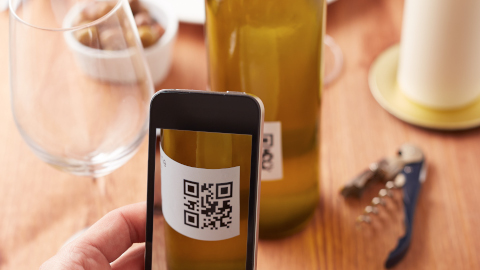Blockchain technologies developed to improve wine traceability

An international consortium led by the UAB will improve the productivity of vineyards by guarateeing the traceability of the wine throughout its value chain, with smart labels and a blockchain-based data registry. The project's kick-off meeting will take place from 9 to 11 June at the Faculty of Sciences.
08/06/2021
Throughout the next 48 months, the TRACEWINDU project, coordinated by UAB Department in Chemistry Professor Manuel Valiente, will develop a system of smart labels that will allow to trace the trajectory of each bottle from the beginning, and at the same time register each of the places the bottle is sent to. This traceability aims to protect the winemaking industry from annual losses of thousands of millions of Euros due to falsifications and illegal trade. In this sense, consumers from different parts of the world will be able to buy wine with complete and reliable information on the whole production process, from the vineyard to the table.
The researchers correlated the information obtained from the sensorial analysis of wines to generate a graphic of scores to be used as a type of passport for each product, which will be included in the label as a QR code. This smart label will provide all the relevant information about the product from start to finish in a transparent manner by using a decentralised blockchain technology, which prevents any fraudulent handling.
“The project will focus on being able to capitalise on results covering the analytical services of the wine's isotopic footprint for the evaluation of the geographic origin of the wine, the exploitation of information compiled using blockchain technology, cryptography and smart labels in order to meet the growing demand of improvements in the traceability of wines and the authentificity of bottles; as well as evaluating the quality of wines based on their physical, nutraceutic and organoleptic characteristics thanks to easily applied protocols”, explains Manuel Valiente.
In addition, the project also aims to work on improving the productivity of wines through the use of a new combination of plant protection products, with plant extracts as a source of secondary metabolites and other eco-friendly substances.
With this approach, TRACEWINDU will contribute to solving future economic challenges in the winemaking industry within the EU, increasing its industrial competitiveness and giving support to its internationalisation; in the environmental sector, it will meet the producers' demands on the use of natural resources; in the social sector, it will meet the expectations of final consumers in relation to the identity and authenticity, the quality, food safety and diverstiy of wines .
The TRACEWINDU project is funded by the European Union under the Marie Skłodowska-Curie Actions of the Horizon 2020 Programme, a flagship programme of the European Union to provide support to scientific excellence and cooperation between countries, sectors and research fields. The initiative aims to foster, improve and further develop permanent international and intersectorial collaborations between academic research centres and private centres. In this sense, another main objective of this project is the will to strengthen the exchange of knowledge, better practices, innovations, experience, mutual cooperation and a culture of working side-by-side between academics and the business sector of different regions and countries, through the development of a total of 140 mobility exchanges in which 62 researchers and technical staff will participate.
Consortium of 10 institutions
The TRACEWINDU project includes an association of 10 institutions from 6 countries: Universitat Autònoma de Barcelona (Spain), Fundació Parc Tecnòlogic del Vi (Spain), INNOLABS SRL (Italy), Universita di Pisa (Italy), Université de Pau et donis Pays de l’Adour (France), Advanced Isotopic Analysis (France), DNET LABS Doo Novi Sad (Serbia), Univerzitet Donja Gorica Podgorica (Montenegro), 13 Jul Plantaze ad Podgorica (Montenegro) and the Instituto Nacional de Tecnologia Industrial (Argentina).
With reference number GA101007979, the TRACEWINDU project is funded by the EU under the framework of the Horizon 2020 Programme. With a total budget of €1,058,000, the project has been funded 100%.
Link to the project's kick-off meeting programme
This information is related to the following SDG
Responsible consumption and production